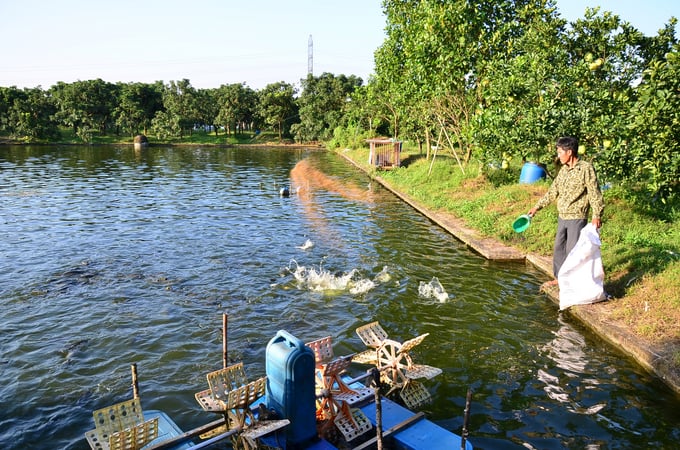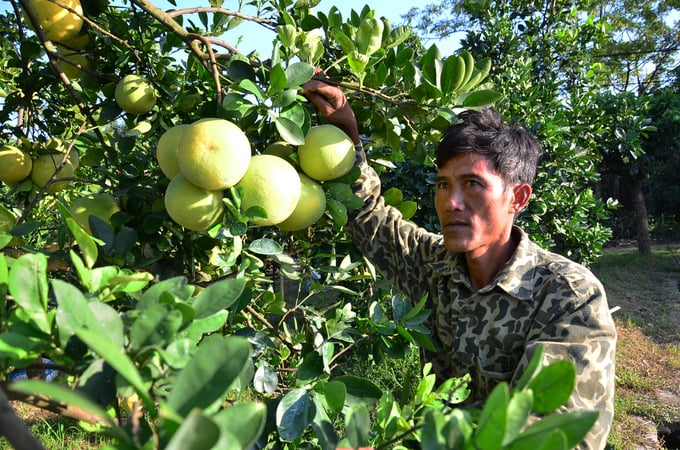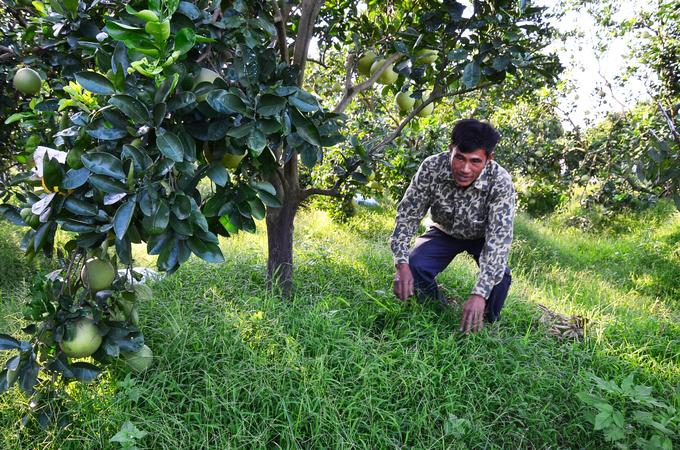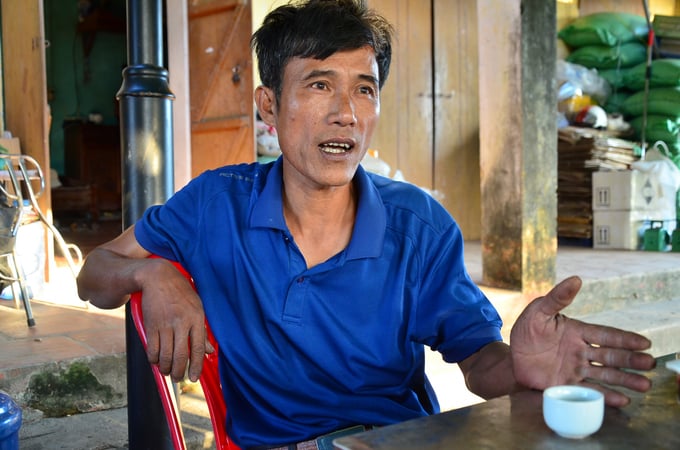June 21, 2025 | 03:54 GMT +7
June 21, 2025 | 03:54 GMT +7
Hotline: 0913.378.918
June 21, 2025 | 03:54 GMT +7
Hotline: 0913.378.918

Tuan’s garden and pond - a beautiful picture. Photo: Duong Dinh Tuong.
Hoang Quang Tuan's farm is located in the middle of a large conversion area of Dai Hung commune, Khoai Chau district, Hung Yen province. In the past, due to the abuse of chemical fertilizers, pesticides, and herbicides, crops quickly fell apart. The fruit quality was low while the production costs were high, causing Tuan to change his way of thinking.
“Using chemicals to clear the grass looked good to the eyes at first, but then the soil quickly became rigid. It has been 9 years since I applied the VAC (garden - pond - barn) model. I nurture the grass, then cut it to feed the fish. When the trees are bearing fruit, I wouldn’t dare to apply lime to reduce acidity because the worm underneath the soil may die. They are the farmer’s eternal plow. Their benefits to the soil and plant are many. I have to protect them.”
While many citrus growers inside and outside the province are suffering from yellow leaf rot, root rot, and greening disease, Tuan's garden is still unbelievably lush. The ecological environment has changed completely since he now knows how to compost manure to fertilize plants or soak fish to turn it into nutrient solutions for irrigation, keeping the grass fresh, protecting the worms in the ground. Season after season, the fruits in his garden become more fragrant, more delicious, more tasteful.

Tuan’s pomelo trees are always fruitful. Photo: Duong Dinh Tuong.
It all started in 2006, when Tuan was still a well-known Cocacola agent in Hung Yen province, distributing products to many districts and towns. Leisurely making a living, suddenly Tuan quit his job and returned to his hometown to invest in a farm, surprising many family members and acquaintances. “You are already a merchant, so why return to the field? Why crawl back to the bushes while you are out in the open?"
Even Tuan himself could not explain the decision at that time. He just felt a deep attachment to agriculture. In the low-lying fields that had had many failed rice crops, he was daring enough to rent those lands for 400 kg of rice/sao/year. Sometimes he even sold his gold to recklessly bid for land for VND 6.9 million/sao/8 years, plus pay an additional 100 kg of rice per year. (We must consider the fact that the price of gold at that time was only VND 7.8 million/bar.)
His story made me feel like his path to agriculture was set up like destiny.
Over the years, the total area of land Tuan accumulated has increased to 10 mau (1 mau equals 10 sao, which is 3,600 m2.10 mau equals 3.6 ha), becoming a “big farmer” alongside his beautiful fish ponds and gardens. “My tears have fallen on this soil. I buried my 17 years of youth here. I have dug and built to turn a low-lying field into the rich farm it is today.”

Thanks to the protection of grass and worms, the soil is always moist and aerated. Photo: Duong Dinh Tuong.
He continued, “Society needs good quality and safe agro-products, but because of the 5-year land rental threshold, most farm owners don't dare to invest much. In my case, building a barn or making a pond is already me risking everything. After 5 years of bidding, the pomelo tree should be planted for 4 years to bear the young fruit. In order for the fruit to taste good, it must be from the age of 8 or older. It would be unfair, not just inadequate, if the land lease was for only 5 years, after which the owners had to clean everything up to return the land to the new owner if they don’t have the capability to do more bidding.
“At the Dai Linh land consolidation and land conversion area of Dai Hung commune has about 40 households, everyone has the same thoughts. Meanwhile, enterprises can lease land for 50 years, excavate and build at will. I see that the state is prioritizing industry but not investing much in agriculture, which is the sector that feeds hundreds of millions of people. At this stage, without a revolution in land policy, it would be impossible to ensure the quality and safety of agro-products, and would not help Vietnamese agro-products be competitive in the market.

The calloused hand over the years of Hoang Quang Tuan. Photo: Duong Dinh Tuong.
“The input is now more than the output. In only two years, each bag of bran went from VND 280,000 to VND 450,000 per bag, but the price of fish has dropped, common large carp is only VND 38,000/kg, barb is only VND 5,000-7,000/kg, so cheap that it would be better to pour them into drums to soak and make irrigation solutions for the garden. About 70% of fish farming households had to run like a bat out of hell, but I was able to maintain it thanks to not only feeding the fish with industrial bran but also adding more green food. Temporarily speaking, I call it break-even although the revenue is up to VND 3 billion/year. In that same amount of time, each bag of fertilizer has nearly doubled in price, while the price of longan this year is VND 5,000 - 6,000/kg, the price of pomelo is also very low, so farming is not very profitable.
“I have poured so much money and efforts into this farm. As if fate has settled, I don’t see any other way. Farming is such arduous work, but I can sleep well after coming back home at night. People die one day, but I am able to do what I like and be useful to society. I have absolutely no regrets."
Translated by Samuel Pham
/2025/06/17/3942-2-143243_548.jpg)
(VAN) Recently, in Sweden, the Secretary of the Binh Dinh Provincial Party Committee presented the Investment Registration Certificate for the 'Polyester Fabric Recycling Complex' project to SYRE Impact-AB Company.
/2025/06/12/3721-2-202745_83.jpg)
(VAN) TH made an impression at Seoul Food 2025 with its line of natural beverages, paving the way for Vietnamese food products to enter the South Korean market.

(VAN) Soc Trang's success in rice exports stems from a strategy of developing fragrant and specialty rice cultivation areas and standardizing production toward low-emission practices.
/2025/06/11/1311-5-120811_839.jpg)
(VAN) The pig farming industry is facing the challenge of comprehensive restructuring to meet requirements for quality, safety, traceability, and market expansion both domestically and for export.

(VAN) Vietnam considers participating in ALGROALBA in order to expand agricultural production, coordinate the assessment and effective exploitation potential land.
/2025/06/05/5314-1-184727_407.jpg)
(VAN) From seemingly worthless fish scales and skin, enzymes and lactic ferments can transform by-products into peptides, opening a sustainable, effective business direction and elevating Vietnamese seafood.

(VAN) TTC AgriS and IFC signed a strategic partnership to develop a sustainable agricultural value chain, aiming to achieve the Net Zero target by 2035.